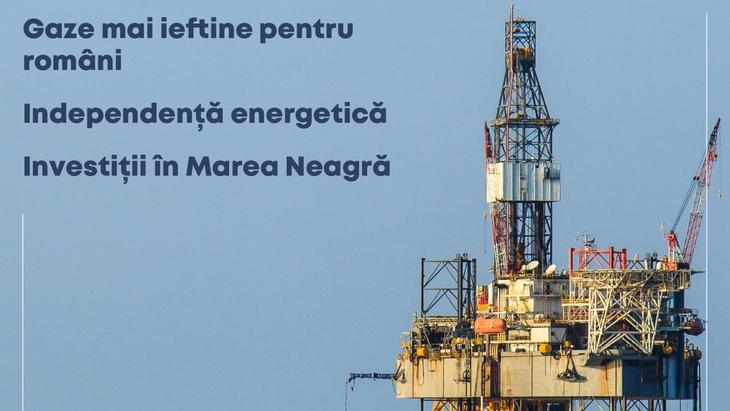The ruling coalition leaders have sent the offshore law in Parliament and are announcing the existence of a political majority for its swift adoption. The document amends Law no. 256/2018 in 10 essential points and amends the Annex on the calculation formula for the additional income tax. Deep onshore oil perimeters are also included in the same fiscal regime.
Clarifications and extensions
In fact, it will probably be necessary to clarify the wording in Article 1 to make it clear that the new form of law applies to all offshore oil perimeters, not just deep-sea ones. Article 2 clarifies the meaning of the phrase “the specific tax regime applicable to exploration, development, exploitation and decommissioning activities”, the one in connection with which investors interested in the Black Sea exploitation projects have requested stability guarantees included in the law. This article also clarifies the notion of “investments in the upstream segment” and defines the deep onshore oil perimeter, as that oil perimeter located on land where works are carried out at depths greater than 3000 meters.
Article 3 clarifies that the new tax regime will also apply to offshore and/or deep-sea offshore oil perimeters under construction on 1 January 2022, including the Black Sea Oil and Gas Midia project and the Neptune Deep project to be run by OMV Petrom and Romgaz.
New tax grid and investment deduction
Articles 4 and 5 drastically amend Article 19 of the existing law – the one on the tax framework and the deduction of investments from the additional income tax. Thus, the investment deduction is accepted, up to a maximum of 40% of the total additional income tax. Regarding the application of the additional income tax, a new minimum threshold of 85 lei/MWh is introduced (compared to 45 lei/MWh, in the law in force), so that the new grid, to be enforced starting from January 1, 2023, might look like this:
- a) 15% of the additional revenues obtained following the practice of prices higher than 85 lei/MWh and less than or equal to 100 lei/MWh;
- b) 30% of the additional revenues obtained following the practice of prices higher than 100 lei/MWh and less than or equal to 115 lei/MWh;
- c) 35% of the additional revenues obtained as a result of prices higher than 115 lei/MWh and less than or equal to 130 lei/MWh;
- d) 40% of the additional revenues obtained following the practice of prices higher than 130 lei/MWh and lower or equal to 145 lei/MWh;
- e) 50% of the additional revenues obtained following the practice of prices higher than 145 lei/MWh and lower or equal to 160 lei/MWh;
- f) 55% of the additional revenues obtained following the practice of prices higher than 160 lei/MWh and lower or equal to 175 lei/MWh;
- g) 60% of the additional revenues obtained following the practice of prices higher than 175 lei/MWh and lower or equal to 190 lei/MWh;
- h) 70% of the additional revenues obtained as a result of prices higher than 190 lei/MWh
Investment fund
The draft of the new offshore law provides that the amounts owed by the holders of oil agreements relating to offshore and deep-sea offshore perimeters as additional income tax are collected in a special account. It would be “used to finance the establishment and expansion of natural gas distribution networks and connections to the national natural gas transmission system”. However, there is also the mention “as well as other investments established by Government decision”, which allows a behavior adapted to the realities of the coming years, when natural gas pipelines may no longer be the most suitable investment destination. Here, however, clarification could be introduced to keep the allocation of funds limited to the energy sector.
Clarifications, commitments and relaxation
Articles 6 and 7 eliminate any interference by the authorities in the way in which exploration companies will dispose of the volumes of natural gas produced (price, trade, supply and/or sale). However, there are always references such as “except for the mandatory legal provisions in Romania and the European Union” and “in accordance with national law and the principles of the European free market”. The wording leaves enough room for maneuver for national authorities but offers investors a guarantee by invoking EU free-market principles. The principle of fiscal stability is explicitly mentioned in Article 7.
Article 8 removes the sanction with a “fine corresponding to 10% of the turnover in the year in which the violation was found” from the current offshore law, while Articles 9 and 10 explain some elements of law enforcement.
If soon adopted, the new form of offshore law will allow the exploitation of natural gas resources in the Midia perimeter to begin, without the threat of international arbitration already invoked by the operator Black Sea Oil and Gas. More importantly, it would open the way for the investors to consider the opportunity of the investment decision for the Neptune Deep perimeter, in a much more complicated market context than some years before. Not only the geopolitical and military risks of the Black Sea need to be assessed, but also the future of natural gas trading in Europe during the first decades of an accelerated green energy transition. At the same time, the transformation of OMV Petrom, and even the OMV group, into an energy company of the future depends essentially on the resources of the Black Sea, which could grant them an operating base for another 2-3 decades.
